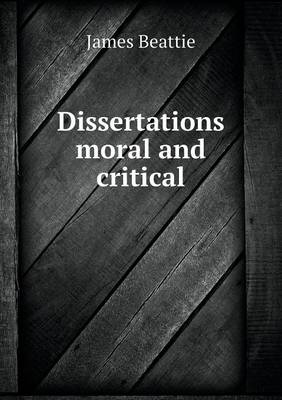Works by James Beattie
6 total works
Important in the history of the Scottish Enlightenment and 18th-century literature and thought, James Beattie (1735-1803) was a figure of high reputation and influence in a variety of fields, including philosophy, poetry, belles-lettres, education, language and religion. He varied and valuable works in prose and verse are presented here. They form important source documents for all scholars of 18th-century thought. Each features a comprehensive introduction by Beattie scholar Professor Roger J. Robinson. This text shows Beattie as a practical teacher, literary theorist and moralist.
Important in the history of the Scottish Enlightenment and 18th-century literature and thought, James Beattie (1735-1803) was a figure of high reputation and influence in a variety of fields, including philosophy, poetry, belles-lettres, education, language and religion. He varied and valuable works in prose and verse are presented here. They form important source documents for all scholars of 18th-century thought. Each features a comprehensive introduction by Beattie scholar Professor Roger J. Robinson. These literary essays were well received by the critics who praised Beattie's style and approach. The book continued to be highly regarded well into the 19th-century mainly for the essays' influence in forming a new literary taste and preparing the way for the ideas of the Romantics.
The Evidences of the Christian Religion, Briefly and Plainly Stated
by James Beattie
Published 1 March 1999
Important in the history of the Scottish Enlightenment and 18th-century literature and thought, James Beattie (1735-1803) was a figure of high reputation and influence in a variety of fields, including philosophy, poetry, belles-lettres, education, language and religion. He varied and valuable works in prose and verse are presented here. They form important source documents for all scholars of 18th-century thought. Each features a comprehensive introduction by Beattie scholar Professor Roger J. Robinson. This is a straightforward approach to the evidences of the Christian religion.
Important in the history of the Scottish Enlightenment and 18th-century literature and thought, James Beattie (1735-1803) was a figure of high reputation and influence in a variety of fields, including philosophy, poetry, belles-lettres, education, language and religion. He varied and valuable works in prose and verse are presented here. They form important source documents for all scholars of 18th-century thought. Each features a comprehensive introduction by Beattie scholar Professor Roger J. Robinson. This work contains Beattie's thoughts on the whole range of issues which he had pondered throughout his life. This work therefore conveys a fuller account of his ideas as a philosopher, poet, man of letters, moralist and Christian apologist than can be found either in his own prose or his letters.
Important in the history of the Scottish Enlightenment and 18th-century literature and thought, James Beattie (1735-1803) was a figure of high reputation and influence in a variety of fields, including philosophy, poetry, belles-lettres, education, language and religion. He varied and valuable works in prose and verse are presented here. They form important source documents for all scholars of 18th-century thought. Each features a comprehensive introduction by Beattie scholar Professor Roger J. Robinson. Beattie's most important poems are reproduced here in the form in which they were known in the late 18th-century. They include "The Minstrel", which affected both Wordsworth and the Romantics.
An Essay on the Nature and Immutability of Truth, in Opposition to Sophistry and Scepticism
by James Beattie
Published 1 March 1999
Important in the history of the Scottish Enlightenment and 18th-century literature and thought, James Beattie (1735-1803) was a figure of high reputation and influence in a variety of fields, including philosophy, poetry, belles-lettres, education, language and religion. He varied and valuable works in prose and verse are presented here. They form important source documents for all scholars of 18th-century thought. Each features a comprehensive introduction by Beattie scholar Professor Roger J. Robinson. This book established Beattie's reputation and greatly influenced the subsequent course of his life, friendships and literary relationships. Important to the understanding of the rest of Beattie's other literary work, it is primarily and specifically an attack on David Hume. The second edition contains the Postscript. This is also the edition which King George III has on his bookshelf at Kew and the one used by Samuel Johnson.

